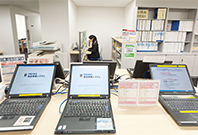A Paragon of Intellect and Morals (2)
<Case 3 Seeking Employment> To enhance one's abilities that will benefit society
Daisuke Okamoto
Professor, Faculty of Business and Commerce,
Director, Placement and Career Services
The ability to think for oneself is an ability on which companies place importance when hiring students. What is this ability in actuality, and what efforts should we make to enhance it? We asked Prof. Daisuke Okamoto, who serves as the Director of Placement and Career Services.

Nationally, Keio University students have top-class academic skills, but this is only the ability to cope with written tests. Tests always have answers, so our students are good at finding the correct answers. To put it the other way around, they are not always good at coping with problems that do not have answers. What is required after going out into the world is the ability to cope with a problem that does not have an answer, rather than the ability to solve a problem that has a correct answer, and naturally, this becomes important when seeking a job. President Seike often speaks about thinking for oneself, and his words actually point out the significance of this problem. It is said that communication skills are considered most important in job hunting. These skills are actually also closely associated with thinking for oneself.
To be able to speak well with others is a communication skill in a literal sense, but when we specify this to include what companies expect from students, this expression has a slightly deeper meaning. Being able to make conversation with others is not sufficient; what is important is whether one can listen carefully to another person, correctly comprehend the present situation and issue, and also precisely express one’s own opinions. In order to do this, one must set one’s own bearings/a solid foundation and develop a way of thinking for oneself. What is necessary to achieve this?

I always tell students to develop their expertise. This is because when you can thoroughly understand a specialized field, you will eventually be able to comprehend what you face at work with secure bearings/a solid foundation. Even when trying to understand what another person is saying, if you believe every word of it without question, you cannot express your own opinion. When facing a problem that may not have a correct answer, comprehension of both one’s position and foundation/bearings is important. In order to express an opinion, you need to have a way of thinking and a foundation on which to think independently. The specialized field that you study in university serves as a basis for these skills.
It is said that Keio University is the best university in terms of finding employment, but this is not simply because of trivial job guidance tricks, it is because of its education policy of focusing on research and having students think independently about problems without answers.
<Case 4 Correspondence Courses> Learning again after starting a career
Yukihiro Ikeda
Professor, Faculty of Economics,
Director, Correspondence Courses
“Learning” is not a privilege given only to young people; it is the right of people of all generations. Professor Yukihiro Ikeda, who serves as the Director of Correspondence Courses, speaks about the original meaning of universities as open environments for learning.
More than 20 years have passed since I started my career as a faculty member. Setting aside my position as a researcher, one thing I feel as someone who works in the field of education is that schools and universities are only one of many environments for learning. When we think about Kōan Ogata’s school or the early days of Keio University, they were institutions where people who were slightly ahead of others offered their assistance to help others learn. Following the University Establishment Ordinance years later, universities become more organized as institutions for higher education, but we must not forget that the starting point of our organization was a gathering of likeminded people who wished to help one another learn.
The impulse of learning may not always come about during the late teens to the early twenties, before going out into the world. In fact, generally speaking it may be the other way around. I have been involved in the Correspondence Courses since last October, but the majority of students are working people. Keio students with various experiences may have an advantage in learning because of their rich experience in society. Needless to say, we must be aware that with age, our ways of thinking tend to become more rigid, just as with myself.

There are many students in Correspondence Courses who already have a bachelor’s degree. These people are taking on the challenge of studying something different from the specialized field they have studied in the past. As it is frequently pointed out, a common weakness of academia in our country is that boundaries between disciplines are too high. Mastering a certain field is a positive thing, but to speak about other fields is sometimes considered crossing the line and is not welcomed. However, if this is the case, it will not contribute to the understanding of all kinds of things that occur in real life. Admission to a university to get a second bachelor’s degree is actually difficult as you have to satisfy various conditions, but I think that completing studies of a certain field and then challenging a new field is one form of studying for those who have started their careers. There are many specific issues such as law and economics or art management that require knowledge of multiple disciplines.
Upgrading services as an institution for higher education is necessary with no doubt, but at the same time, a university as a learning environment should always be an open entity. Classrooms, faculty members, students, and calculating credits are only a few aspects of a university. We may say that the roots of the university lie in a community where people share an impetus for learning.
*Position titles, etc., are those at the time of publishing.
